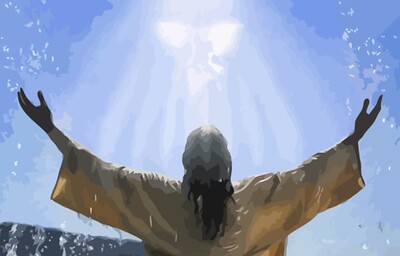Through Christ’s Baptism, We become Adopted Children of God
Today we celebrate the Feast of the Baptism of the Lord in the River Jordan by John the Baptist. This feast officially ends the season of Christmas which began on the 24th Night of December. The Church as we know exists to evangelize and to celebrate the mysteries of salvation. We do not only celebrate the Incarnation of the Word of God in the person of Jesus Christ, but we also do celebrate many of the major events in the life of Jesus Christ.
It is a bit strange and appears paradoxical that Jesus Christ, the sinless and savior of humankind will join the ranks of sinners who want to be baptized by John. Many devout Christians become surprised, some even horrified, when they hear that Jesus too had to go to John and receive the Baptism of Repentance. Was it necessary, did Jesus have to go that far, and what could be his intentions of doing what he did?
In reality, Jesus did not need the Baptism of Repentance administered by John the Baptist since he is the Lamb of God who takes away the sin of the world. But he voluntarily placed himself in line with the sinners who were being baptized by John as a sign of solidarity to sinful humanity. Jesus Christ identified himself with his people by that singular act of allowing himself to be counted among the ordinary people.
St. Paul captures it more beautifully,
“Even though he was in the form of God, he did not regard equality with God as something to be grasped, but emptied himself, taking on the nature of a servant, made in human likeness and in his appearance found as a man” (Philippians 2:6-7).
Later at Calvary, he would be hanged among two sinners. The lesson that the Lord wants to teach his followers is that we will be in the best position to help others when we identify ourselves with them. St. Paul tried to imitate the Lord in this regard:
“To the weak I became weak, to win the weak. I have become all things to all people so that by all possible means I might save some”(1 Cori 9:22).
How do we identify ourselves with those who need help, with those who need Jesus, with those who need salvation? Can we possibly help them when we do not appreciate them?
Significance of the Baptism of Our Lord
Jesus descended into River Jordan not to be sanctified through the baptism of John, but rather that he himself, the Anointed, might sanctify the waters of the Jordan and by extension all waters which will later be used as the primary element in Christian baptism. By his Baptism in River Jordan, the Lord Jesus Christ sanctified all waters for Baptism.
The sacrament of Baptism cleanses us from original and personal sins, confers sanctifying grace and makes us members of the church and adopted children of God. So, our baptism today is totally different from the Baptism of John. Again, the baptism of Jesus in the River Jordan was a clear demonstration of his humility and sensitivity to the established order. Since he was divine, Jesus was holier and powerful than John.
Comparatively, Jesus was greater than John the Baptist in all aspects. He himself had said that among those born of women, no one is greater than John, but the least in the Kingdom of God is greater than John (Cf. Matt. 11:11, Luke 7:28). Jesus knew he was without sin, but he did not prove it. He also knew that he did not need baptism from John the Baptist, but he did not prove it. Jesus was greater and more powerful than John the Baptist, but he did not demonstrate it. He did not compete with John the Baptist.
It is said that sometimes trying to prove that you are the best is an insult. In many instances, it is absolutely unnecessary to prove how powerful, how rich, how pretty, how connected, or how influential you are. The world is in perpetual chaos because of unhealthy competition for attention, recognition, and the desire to outclass the other. Today, with the least opportunity people want to show their real size, their power and how smart they could possibly be. This is one of our modern-day diseases and the cure is humility, unalloyed humility.
New Year’s Blessings From Father Osei
The baptism of Jesus is above all an Epiphany, an unveiling, a revelation of God. Through the visible descent of the Holy Spirit in the form of a dove and the voice of the Father from heaven, which testifies to him as the beloved Son, the Father revealed the identity of Jesus as the Redeemer of humanity. Jesus descended into the Jordan River in order to be revealed as the Lamb of God, who takes away the sin of the world. Even though the two had met during the visitation of Mary to Elizabeth, it was through his baptism that John came to know Jesus publicly.
“I did not know Him, but He who sent me to baptize with water said to me, ‘Upon whom you see the Spirit descending, and remaining on Him, this is He who baptizes with the Holy Spirit’(John 1:33).
The birth of Christ, the feast of Epiphany, and the baptism of Christ are closely related. Jesus Christ is revealed both to us as a Messiah and the Lord. His birth reveals his human nature, whereas his baptism reveals his divine nature. We were also declared favorite sons and daughters of God at our baptism. Anointed with Sacred Chrism and the Holy Spirit descended upon us at our baptism.
We became new creation and brothers and sisters to one another in Christ. God through his Son has promised us an eternal inheritance. As we celebrate the Baptism of Jesus, let us ask the Lord to help us remain faithful to the grace of baptism and live by it. Always remember that once baptized, we will always remain Catholics.
Amen!


Recent Comments